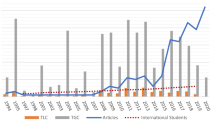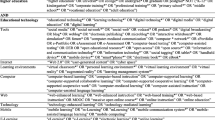Abstract
To provide a diverse perspective of in-service teachers’ TPACK (Technological, Pedagogical, and Content Knowledge) and how TPACK is reflected in culturally diverse classrooms, this study examines the influences of teachers’ knowledge and understanding of their student’s home culture and background on their construction of TPACK. In this study, using both survey-based data and qualitative interview data, we use a sequential explanatory mixed-method design to provide a more robust understanding of this phenomenon. First, we use quantitative analysis examining descriptive statistics, correlation coefficients, and one-way ANOVA analysis, and then we analyze qualitative findings to identify key themes among selected teacher participants. The findings indicated a significant relationship between in-service teachers’ TPACK and their knowledge of students regardless of their teaching experience or gender. However, during interviews participants identified difficulties in effectively integrating TPACK domains of knowledge in a meaningful framework that could help them to design their technology-based activities by considering students’ learning needs and the affordance of technologies. Implications of this study suggest that technology integration and student cultural background are intertwined and teachers should be cognizant of these relationships in the course and lesson design. The study also provides further support for examining the context, such as cultural background, within the TPACK framework.

Similar content being viewed by others
Data availability
The dataset generated during and /or analyzed during this current study are not publicly available due to the protection of participants’ privacy but are available from the corresponding author upon reasonable request.
References
Adam, A. (2017). A framework for seeking the connections between technology, pedagogy and culture: A study in the Maldives. Journal of Open, Flexible, and Distance Learning, 21(1), 35–51.
Burnard, P. (1991). A method of analyzing interview transcripts in qualitative research. Nurse Education Today, 11(6), 461–466.
Creamer, E. G. (2018). Enlarging the conceptualization of mixed method approaches to grounded theory with intervention research. American Behavioral Scientist, 62(7), 919–934.
Cheng, S. L., & Xie, K. (2018). The relations among teachers value beliefs, personal characteristics, and TPACK in intervention and non-intervention settings. Teaching and Teacher Education, 74, 98–113.
Chuang, H. H., Shih, C. L., & Cheng, M. M. (2020). Teachers’ perceptions of culturally responsive teaching in technology-supported learning environments. British Journal of Educational Technology, 51(6), 2442–2460.
Cox, S., & Graham, C. R. (2009). Using an elaborated model of the TPACK framework to analyze and depict teacher knowledge. TechTrends, 53(5), 60–69.
Denzin, N. K., Lincoln, Y. S., & Giardina, M. D. (2006). Disciplining qualitative research. International Journal of Qualitative Studies in Education, 19(6), 769–782.
DeVellis, R. F., & Thorpe, C. T. (2021). Scale development: Theory and applications (5th ed.). Sage Publications.
Fakolade, O. A., Adeniyi, S. O., & Tella, A. (2009). Attitude of teachers to the attitude of inclusion of special needs children in general education classrooms: The case of teachers in some selected schools in Nigeria. International Electronic Journal of Elementary Education, 1(3), 155–169.
Frey, W. H. (1 C.E.). New projections point to a majority minority nation in 2044. Brookings. https://www.brookings.edu/blog/the-avenue/2014/12/12/new-projections-point-to-a-majority-minority-nation-in-2044/. Accessed 22 June 2022
Gay, G. (2018). Culturally Responsive Teaching: Theory, Research, and Practice (3rd ed.). Teachers College Press.
Goradia, T. (2018). Role of educational technologies utilizing the TPACK framework and 21st century pedagogies: Academics’ perspectives. IAFOR Journal of Education, 6(3), 43–61.
Harris, J. B., & Hofer, M. J. (2011). Technological pedagogical content knowledge (TPACK) in action: A descriptive study of secondary teachers’ curriculum-based, technology-related instructional planning. Journal of Research on Technology in Education, 43(3), 211–229.
Helppolainen, S., & Aksela, M. (2020). Science teachers’ ICT use from a viewpoint of Technological Pedagogical Content Knowledge (TPCK). Teknologia Kemian Opetuksessa, 1(1), 2–2.
Jang, S. J., & Tsai, M. F. (2013). Exploring the TPACK of Taiwanese secondary school science teachers using a new contextualized TPACK model. Australasian Journal of Educational Technology, 29(4), 566–580.
Joo, Y. J., Park, S., & Lim, E. (2018). Factors influencing preservice teachers’ intention to use technology: TPACK, teacher self-efficacy, and technology acceptance model. Journal of Educational Technology & Society, 21(3), 48–59.
Kelly, M. (2008). Incorporating context into TPCK-based instructional design. In Society for Information Technology & Teacher Education International Conference (pp. 5257–5262). Association for the Advancement of Computing in Education (AACE).
Koehler, M., & Mishra, P. (2009). What is Technological Pedagogical Content Knowledge (TPACK)? Contemporary Issues in Technology and Teacher Education, 9(1), 60–70. Waynesville, NC USA: Society for Information Technology & Teacher Education. Retrieved January 11, 2023 from https://www.learntechlib.org/primary/p/29544/
Koh, J. H. L., Chai, C. S., & Tay, L. Y. (2014). TPACK-in-Action: Unpacking the contextual influences of teachers’ construction of technological pedagogical content knowledge (TPACK). Computers & Education, 78, 20–29.
Koh, J. H. L., Chai, C. S., & Tsai, C. C. (2013). Examining practicing teachers’ perceptions of technological pedagogical content knowledge (TPACK) pathways: A structural equation modeling approach. Instructional Science, 41, 793–809.
Ladson-Billings, G. (2016). Who can teach our children? Re-stating the case for culturally relevant teaching. Michigan Reading Journal, 48(2), 8.
Lin, T. C., Tsai, C. C., Chai, C. S., & Lee, M. H. (2013). Identifying science teachers’ perceptions of technological pedagogical and content knowledge (TPACK). Journal of Science Education and Technology, 22, 325–336.
Mishra, P. (2019). Considering contextual knowledge: The TPACK diagram gets an upgrade. Journal of Digital Learning in Teacher Education, 35(2), 76–78.
Mishra, P., & Koehler, M. J. (2006). Technological pedagogical content knowledge: A framework for teacher knowledge. Teachers College Record, 108(6), 1017–1054.
Nunnally, J., & Bernstein, I. (1994). Psychometric theory (3rd ed.). McGraw-Hill.
Pang, V. (2018). Diversity & Equity in the Classroom. Cengage Learning.
Phillips, M., Koehler, M., Rosenberg, J., & Zunica, B. (2017). Unpacking TPACK: Reconsidering knowledge and context in teacher practice. In Society for Information Technology & Teacher Education International Conference (pp. 2422–2429). Association for the Advancement of Computing in Education (AACE).
Porras-Hernández, L. H., & Salinas-Amescua, B. (2013). Strengthening TPACK: A broader notion of context and the use of teacher’s narratives to reveal knowledge construction. Journal of Educational Computing Research, 48(2), 223–244.
Qiu, C. A., He, H. X., Chen, G. L., & Xiong, M. X. (2022). Pre-service teachers’ perceptions of technological pedagogical content knowledge in mainland China: A survey of teachers of Chinese as a second language. Education and Information Technologies, 1–25.
Rosenberg, J. M., & Koehler, M. J. (2015). Context and technological pedagogical content knowledge (TPACK): A systematic review. Journal of Research on Technology in Education, 47(3), 186–210.
Roussinos, D., & Jimoyiannis, A. (2019). Examining primary education teachers’ perceptions of TPACK and the related educational context factors. Journal of Research on Technology in Education, 51(4), 377–397.
Saubern, R., Urbach, D., Koehler, M., & Phillips, M. (2020). Describing increasing proficiency in teachers’ knowledge of the effective use of digital technology. Computers & Education, 147, 103784.
Savec, V. F. (2020). The opportunities and challenges for ICT in science education. Teknologia Kemian Opetuksessa, 1(1), 1–1.
Siefert, B., Kelly, K., Yearta, L., & Oliveira, T. (2019). Teacher perceptions and use of technology across content areas with linguistically diverse middle school students. Journal of Digital Learning in Teacher Education, 35(2), 107–121.
Shulman, L. S. (1986). Those who understand: Knowledge growth in teaching. Educational Researcher, 15(2), 4–14.
Shulman, L. S. (1987). Knowledge and teaching: Foundations of the new reform. Harvard Educational Review, 57, 1–22.
Siwatu, K. O., Putman, S. M., Starker-Glass, T. V., & Lewis, C. W. (2017). The culturally responsive classroom management self-efficacy scale: Development and initial validation. Urban Education, 52(7), 862–888.
Swallow, M. J., & Olofson, M. W. (2017). Contextual understandings in the TPACK framework. Journal of Research on Technology in Education, 49(3–4), 228–244.
Tabachnick, B. G., & Fidell, L. S. (2013). Using multivariate statistics (6th ed., Vol. 5). Pearson Boston.
TEXAS: 2020 Census. (2021). Retrieved August 14, 2022, from https://www.census.gov/library/stories/state-by-state/texas-population-change-between-census-decade.html
Tsai, H. H., Lee, H. Y., & Yu, H. C. (2008). Developing the digital content industry in Taiwan. Review of Policy Research, 25(2), 169–188.
Vespa, J., Armstrong, D. M., & Medina, L. (2018). Demographic turning points for the United States: Population projections for 2020 to 2060. US Department of Commerce, Economics and Statistics Administration, US Census Bureau.
Weng, L. J. (2004). Impact of the number of response categories and anchor labels on coefficient alpha and test-retest reliability. Educational and Psychological Measurement, 64(6), 956–972.
Xie, K., Kim, M. K., Cheng, S.-L., & Luthy, N. C. (2017). Teacher professional development through digital content evaluation. Educational Technology Research and Development, 65(4), 1067–1103.
Author information
Authors and Affiliations
Corresponding author
Ethics declarations
Conflict of interest
None
Additional information
Publisher's note
Springer Nature remains neutral with regard to jurisdictional claims in published maps and institutional affiliations.
Appendix
Rights and permissions
Springer Nature or its licensor (e.g. a society or other partner) holds exclusive rights to this article under a publishing agreement with the author(s) or other rightsholder(s); author self-archiving of the accepted manuscript version of this article is solely governed by the terms of such publishing agreement and applicable law.
About this article
Cite this article
Ali, S.S., Hawk, N.A. Examining cultural background as context and in-service teachers’ perception of TPACK: A mixed-method study. Educ Inf Technol 29, 3547–3570 (2024). https://doi.org/10.1007/s10639-023-11939-7
Received:
Accepted:
Published:
Issue Date:
DOI: https://doi.org/10.1007/s10639-023-11939-7




